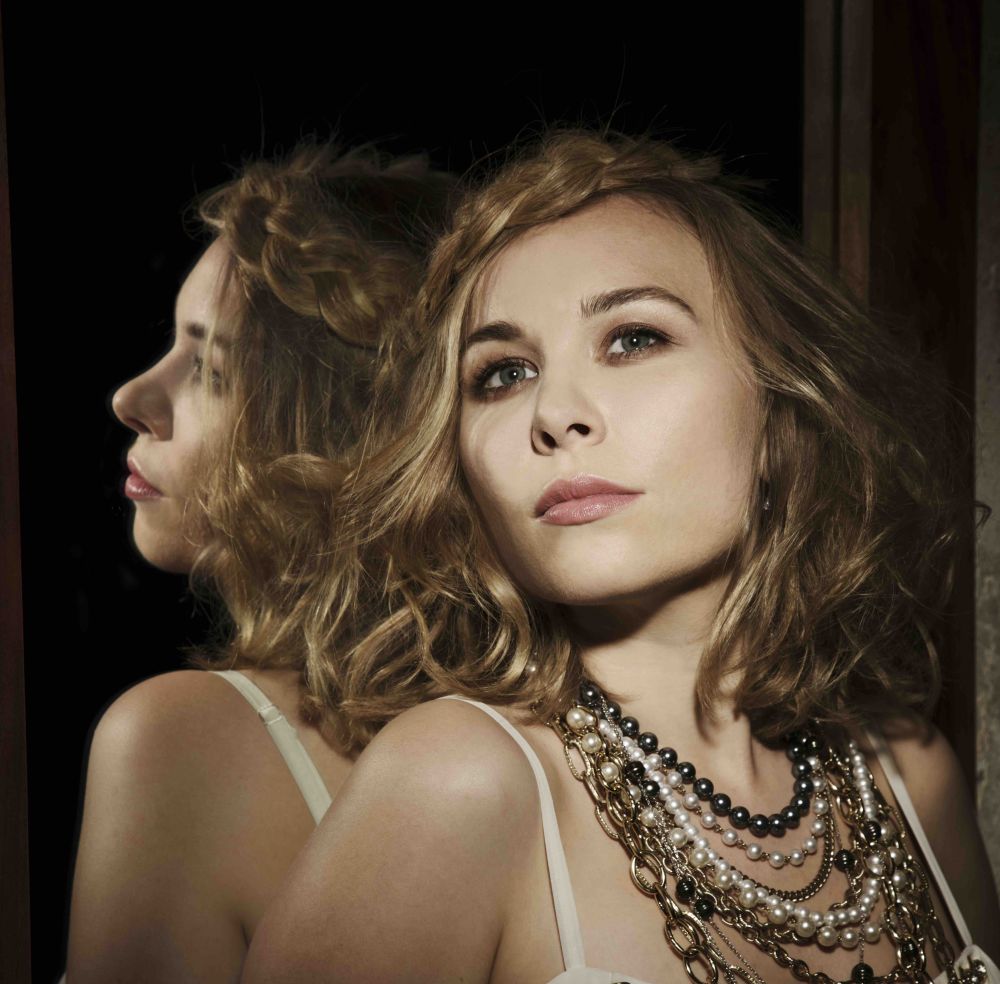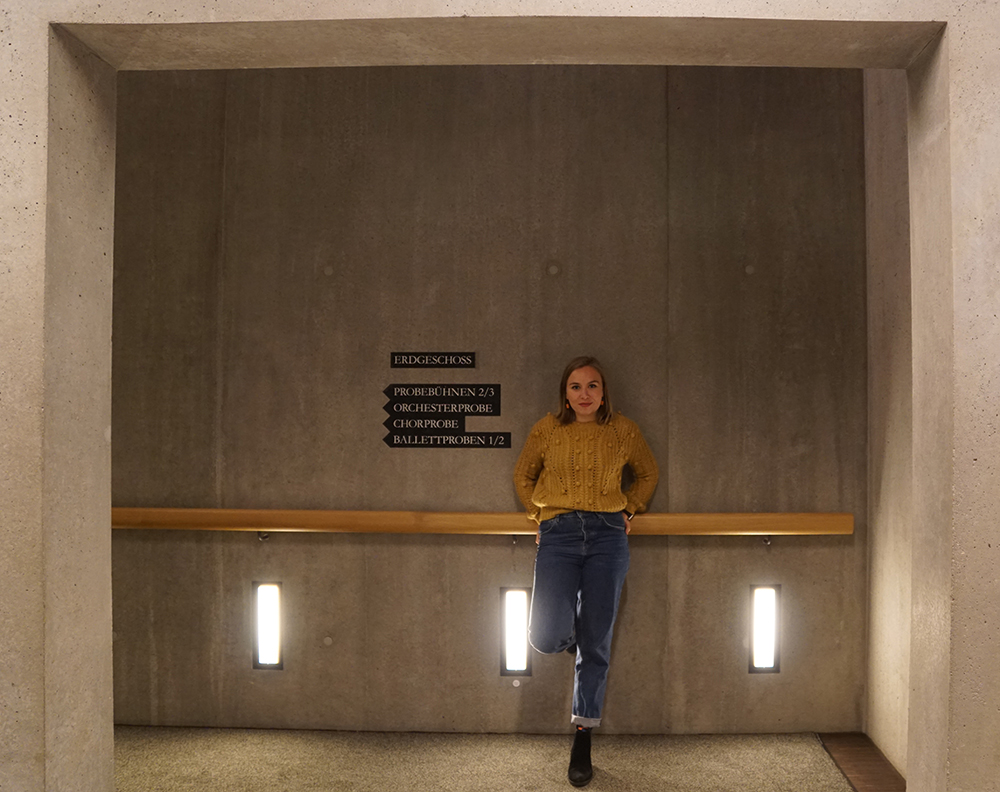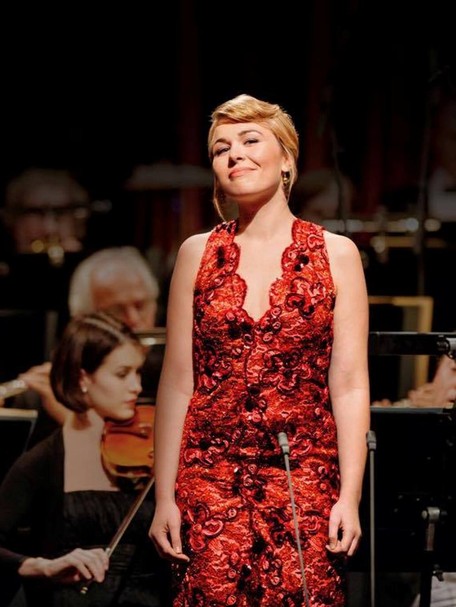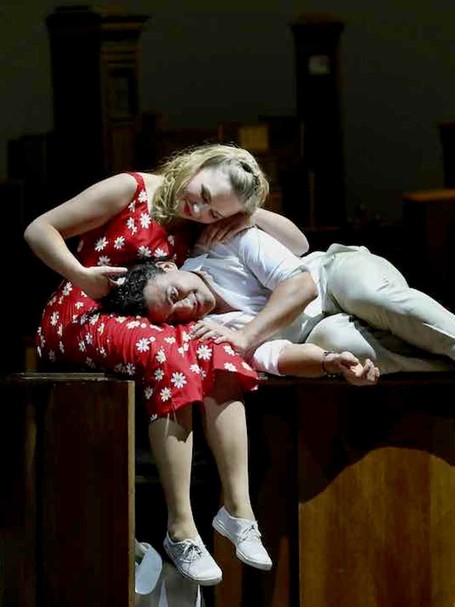

Born in 1991, French soprano Elsa Dreisig went directly from the Conservatory to one of the most prestigious opera troupes in the world, the Berlin Staatsoper. She now divides her time between international stages and the Berlin Staatsoper troupe. When I spoke to some of her old teachers from the Conservatoire National de Paris, they all responded in the same fashion, “Elsa? Oh yes, she's a rare talent” Rising stars can sometimes be obvious…and Elsa Dreisig seems to sustain this pressure wisely and without any shame. “I want to leave a trace” she says. “I’ve always wanted more”. After interviewing her, I was struck by how much energy I had retrieved from our conversation. I arrived at the Staatsoper exhausted and totally brain-fogged. When I left (two hours later), I was full of vitality. Dreisig's liveliness had contaminated me. During our meeting she let out several laughs that made the chandelier above us tremble. She then swallowed an apple in a rush and went back on stage for rehearsal.
***
Did you inherit your desire to sing from your mother, soprano Inge Dreisig?
I don’t think so. The fact that she sang naturally had an influence. She was in the Wallonie Opera troupe in Belgium, I was in the children’s choir. She would take me everywhere, which formed my ear and afforded me access to the best singing teachers and so on. But it was never my mother’s voice which fascinated me. It was my own.
You started singing in a choir at 6 years old. How did you go from choir singing to opera?
When I turned 17, I told myself: “Enough with the children’s choir. It’s time to start working the adult voice.” I quit the choir and began taking private lessons. I was so attached attached to my child's voice. Yet I knew it was time to break its greenness, as I call it. It took me three years to finally let the flower open into a full-grown woman’s voice. And now I can only hope that this flower will continue blossoming.
At 18, you moved to Paris with the firm intention of studying theater and not singing. Why?
It’s as if I knew that the singing part would work out. In high-school, I didn’t major in music but in theater. I’m convinced one needs more than the voice to communicate emotions on stage. My mother never cared much for acting. She remained focused exclusively on the voice. Perhaps it was a reaction to this approach that led me to desire studying theater. In order to do things differently from my mother. I was also very influenced by Natalie Dessay’s trajectory from theater to opera. So I applied to different theater schools. When the first one rejected me, I sensed I was walking towards failure so I abandoned the process entirely.
Did you experience this rejection as a failure?
Let’s say I wasn’t familiar with failures. This rejection made me realize I wasn’t talented enough. No one had ever told me this before. But I also understood that this Parisian theater world was not and would never be for me. I felt I didn’t quite belong with the other girls going there.
Yasmina Reza got rejected from theater school. Today her plays are performed at the most prestigious venues of the world. Rejections can be salutary.
It’s true. In a way, I never stopped doing theater. I’m continuously working and evolving in theater and perhaps, if I had been formatted by a school, it wouldn’t have been that helpful for me. Who knows?
At 18, you experienced the need to distance yourself from your mother, can you tell me more about this episode?
This need for emancipation started when I decided to let go of my child voice. It meant acknowledging that my mother wasn’t the only singer. I had always been singing with her. I was accompanying her with my child-voice and I sensed the urge to give more space to my own voice and its role. If I had decided to remain in this child position, I would never have managed. I guess most women share similar stories with their mothers. If you don’t detach yourself, many possibilities end up closing.
What else did you learn from your mother?
I learned what it meant to suddenly fail in this profession. When my mother gave birth to my two step-sisters, her career stopped practically overnight. She lost all her contacts. I guess it’s one of the dangers of this profession. When you reach 40, you have to fight to remain on the top. You face all the young ones arriving, singing as well as you and having youth on their side. I saw how everything could stop from one day to the next. Nothing you accomplish or work to acquire, lasts forever. This was a very difficult phase in my mother’s life. But in a way, I gained from her experience.
 Berlin. Staatsoper rehearsal hall, 2019
Berlin. Staatsoper rehearsal hall, 2019
Do you have a huge ambition?
Yes. Ambition or at least a desire for excellency; to reach the limits of my personal possibility. It might actually be this aspect of my character which brought me apart from my mother. I have different goals than her even though she understands them.
Have you always been this ambitious?
I never had any doubts about my singing objectives. I guess the big difference between me and the other children with whom I was surrounded when I was young and who would also be singing the whole day is that I wanted to go further. To leave a trace. Of course, it’s important to sing well and to be good at what you are doing. But I wanted more. That’s probably also where my desire to study theater came from. When I look around me, the question that continues to attract and fascinate me is La Callas. What did she do to become La Callas? How come no other soprano in history ever managed to go further than her?
What did she do?
One thing we know, and that’s why I so badly wanted to study theater, is that she had a magnetic presence on stage. She had an exquisite sound, style and all the artistry required to sing beautifully, but she also had more. She didn’t always sing well. Sometimes her vibratos were too strong, sometimes she was out of tune. Yet she remains above. She is Maria Callas.
 Neue Stimmen, Gütersloh, 2015
Neue Stimmen, Gütersloh, 2015
You are a soprano but enrolled in the Conservatory as a mezzo soprano. Why?
It was a way to find my voice. To develop the chest sound in the most organic way possible. I had been practicing the highs with my child-voice but was lacking training in the lows. I always knew I would at some point change. After my first year at the Conservatory, I tried to switch to soprano but quickly realized it was too soon. I could feel that singing Pamina wasn’t doing me any good. Everyone encouraged me to continue, saying of course it’s for you, go for it! But I felt a light constriction in the throat. It would hurt. And this, I couldn’t accept.
During your studies at the Conservatory, you would be working night and day. You attended all your classes, took the extra classes available, and simultaneously sang in many concerts.
Yes, I was working non-stop, which was very tiring. I accepted every proposition and ended up with practically one concert a week, where I would earn some 100 euros. But I wasn’t doing it for the money, I was doing it to get as much experience and repertoire as possible. I took many vocal risks too. My teachers would advise me to be cautious, but I never listened. It wasn’t the time to act with prudence and overprotection. I needed experience.
Why do teachers often advise students to be cautious?
They are afraid. Anxious. I think it comes from a personal and existential anxiety which everybody has. Why do we prefer to not be free? Freedom can be scary, it can generate enormous anxiety. I think many people around us are also afraid to get damaged. They might be frustrated too, and I guess they don’t always separate things. I was hugely lucky because nothing nor anyone ever managed to slow me down. When I was told to be cautious, I could hear these were prefabricated sentences. That they weren’t directly addressed to me.
Why did you decide to pass your second year at the Conservatory in Leipzig?
I realised I had been stupid not to learn German at school. So, I left to Leipzig precisely in view of later entering an opera troupe in Germany. It’s by going to Leipzig that I randomly won a competition, which then brought me to Berlin where I sang a recital. And it’s through this recital that I met the person who made me audition for the Berlin Staatsoper. It was all a chain reaction starting with Leipzig. I believe that when young, one should do everything and refuse nothing. We never know where things can lead.
You surprisingly have the consciousness of being young. Whereas generally, when we finally realize we are young, it’s too late. We are old.
It's true! I have the consciousness of my youth. But also, in the sense that I’m not a finished product. Many young singers are ashamed of not having reached full maturity yet, so they keep back. They think they aren’t ready, they are cautious, they wait. I never followed this way of thought. Last year, I sang my first Traviata. It was a big success but surely, (I hope at least), I will sing it better in 5 years. I’m convinced we should always give what we can in the present moment and not less because later might be better.
You believe in action.
I believe in the artistic process more than in the result. But it’s the same with every artist. I love for example watching Giacometti’s evolution. The way he developed his art practice. He slowly discovered his truth, his style. We singers often forget this…We aim for a fixed shape without even knowing our own material.
You managed to find your material?
For now, yes. I have a material with which I can play. I test different ways of singing, languages, styles. A little bit like a painter who tries different brushes on canvas depending on the subject he is illustrating. But in a few years, I’ll need to find my material again.
What’s your relation to Lied singing?
I could never imagine having a Lied career. I need the stage. The costumes, the makeup, the story, the magic. Though, it’s in Lied that I express myself the most. That’s where I can push my artistic practice to its ultimate limit. Lied requires a huge amount of emotional investment. It is much more demanding than opera. For instance, when I sang Violetta in La Traviata, I gave everything I had. I was tired afterwards, but I was protected. Protected by the character. I’m not the one dying, it’s La Traviata. In a Lieder Abend, it’s me. I have no protection. I’m the one being judged, which is also I guess what makes it so exciting. That’s also why after a Lied Abend, I need more time to recover. As Elīna Garanča says, it’s as if all the pieces of the puzzle have been scattered all over the place. It takes time to reassemble the pieces afterwards.
What do you need to arrive on stage concentrated?
To be alone two to three hours prior entering stage.
That’s not a lot.
Yes, but I’m very strict on this point. I don’t want to see anyone, no friends, no family. I need this time to warm up. I have a whole warming up routine. I always start with the same exercises and if they don’t work, I have others. I know after five minutes, if I will experience war or if it will be easy. My first contact to my voice in the day will determine how I will feel on stage.
And are you sometimes mistaken?
When I feel it’s’ easy, I’m rarely mistaken. Then there are these times where after an absolute war backstage, one where I could feel that it wasn’t going well at all, – there occurs a strange type of liberation on stage. One where my absolute anxiety turns into liberation. But it’s impossible to know in advance whether or when this will occur.
 Lauretta in Gianni Schicchi (Puccini), Opéra National de Paris, 2018 © S. Loboff
Lauretta in Gianni Schicchi (Puccini), Opéra National de Paris, 2018 © S. Loboff
Singers are the only musicians whose instruments are jailed in their bodies. How do you cope with this fate?
I’m quite strict with air conditioning. Whether it’s in a taxi or in a hotel room, I immediately ask the ventilation to be switched off.
Do you travel with a humidifier?
Not yet. I try to be as relaxed as possible. That’s why I still drink alcohol occasionally and authorise myself to party. When I start being anxious, instead of feeding it with plenty of little strategies, like taking pills – which I do sometimes take – I first try to understand what the feelings mean. We know anxiety is a somatisation. So, I aim to comprehend its origin and cause, and this helps me a lot.
Do you have a childhood dream which you would like to realize one day?
I did already. It was Pamina. It was my absolute dream being a child.
And do you have new dreams which you would like to fulfil later in life?
I’m dreaming of one day being able to sing Strauss' Salomé.
And what about Wagnerian roles?
I hope not to evolve too much towards a dramatic soprano position. I believe I have the spinto to prevent my voice from getting heavier. I hope at least. I’m wishing for a vocal evolution which is closer to a Brigit Nilsson type than a Nina Stemme.
If you could reincarnate, you can choose the epoch, the country…
Maria Callas.
I didn’t finish my phrase
I know but I couldn’t state any other person.
She ended up alcoholic and alone.
I don’t care. Happiness is not my primary goal in life
What if you couldn’t be Maria Callas?
A cat maybe? No. I could eventually cope with Billie Holliday. Or Giacometti. But for me no one equals Maria Callas.
Let’s say you are a philanthropic billionaire and you are obliged to give away some of your money. What cause would you support?
An ecological one for sure.
Where?
In the North Pole. Or in tropical forests.
Ecology affects you?
Yes. I’m far from being blameless but I try my best to be an ecological citizen. I recycle, I pay attention to which clothes I buy. I never go to Zara nor to H&M. I don’t want my clothes to be produced by Bangladeshi children with toxic products that pollute the world and poison the people making them. Admittingly, I do unfortunately often fly for work, but whenever I can, I aim to take the train. For my vacations, I never take the plane. On the other hand, I take birth control, knowing that it’s bad for the environment. And I’m not vegan either, only vegetarian. I can’t stand to see how animals are treated. So I inform myself where I can and try to act in accordance. On Instagram the only accounts I follow have to do with nature, environment and animals.
Which animals to you feel closest to?
Felines. The pictures I save on my phone from Instagram are mostly lions, tigers, panthers and often they are yawning or having their mouth wide open. I love it. It’s so majestueux.
***